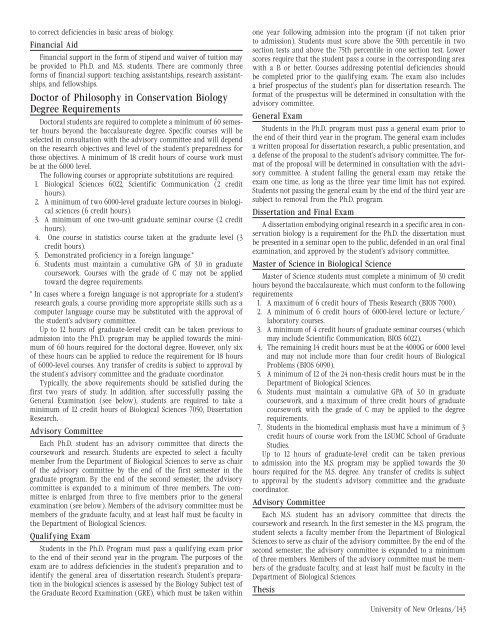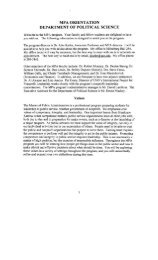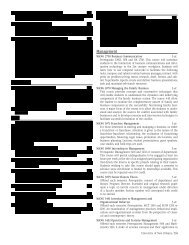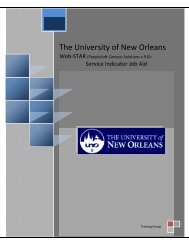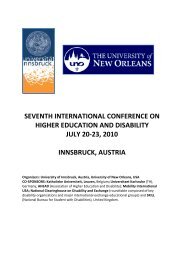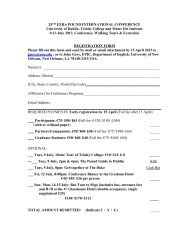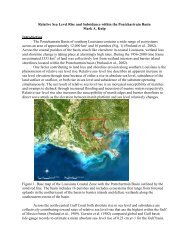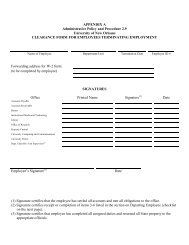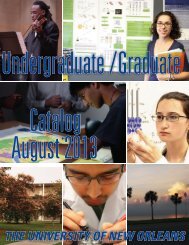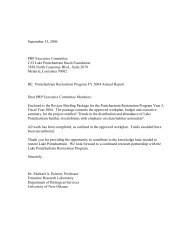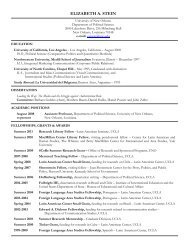Untitled - University of New Orleans
Untitled - University of New Orleans
Untitled - University of New Orleans
Create successful ePaper yourself
Turn your PDF publications into a flip-book with our unique Google optimized e-Paper software.
to correct deficiencies in basic areas <strong>of</strong> biology.<br />
Financial Aid<br />
Financial support in the form <strong>of</strong> stipend and waiver <strong>of</strong> tuition may<br />
be provided to Ph.D. and M.S. students. There are commonly three<br />
forms <strong>of</strong> financial support: teaching assistantships, research assistantships,<br />
and fellowships.<br />
Doctor <strong>of</strong> Philosophy in Conservation Biology<br />
Degree Requirements<br />
Doctoral students are required to complete a minimum <strong>of</strong> 60 semester<br />
hours beyond the baccalaureate degree. Specific courses will be<br />
selected in consultation with the advisory committee and will depend<br />
on the research objectives and level <strong>of</strong> the student’s preparedness for<br />
those objectives. A minimum <strong>of</strong> 18 credit hours <strong>of</strong> course work must<br />
be at the 6000 level.<br />
The following courses or appropriate substitutions are required:<br />
1. Biological Sciences 6022, Scientific Communication (2 credit<br />
hours).<br />
2. A minimum <strong>of</strong> two 6000-level graduate lecture courses in biological<br />
sciences (6 credit hours).<br />
3. A minimum <strong>of</strong> one two-unit graduate seminar course (2 credit<br />
hours).<br />
4. One course in statistics course taken at the graduate level (3<br />
credit hours).<br />
5. Demonstrated pr<strong>of</strong>iciency in a foreign language.*<br />
6. Students must maintain a cumulative GPA <strong>of</strong> 3.0 in graduate<br />
coursework. Courses with the grade <strong>of</strong> C may not be applied<br />
toward the degree requirements.<br />
* In cases where a foreign language is not appropriate for a student’s<br />
research goals, a course providing more appropriate skills such as a<br />
computer language course may be substituted with the approval <strong>of</strong><br />
the student’s advisory committee.<br />
Up to 12 hours <strong>of</strong> graduate-level credit can be taken previous to<br />
admission into the Ph.D. program may be applied towards the minimum<br />
<strong>of</strong> 60 hours required for the doctoral degree. However, only six<br />
<strong>of</strong> these hours can be applied to reduce the requirement for 18 hours<br />
<strong>of</strong> 6000-level courses. Any transfer <strong>of</strong> credits is subject to approval by<br />
the student’s advisory committee and the graduate coordinator.<br />
Typically, the above requirements should be satisfied during the<br />
first two years <strong>of</strong> study. In addition, after successfully passing the<br />
General Examination (see below), students are required to take a<br />
minimum <strong>of</strong> 12 credit hours <strong>of</strong> Biological Sciences 7050, Dissertation<br />
Research.<br />
Advisory Committee<br />
Each Ph.D. student has an advisory committee that directs the<br />
coursework and research. Students are expected to select a faculty<br />
member from the Department <strong>of</strong> Biological Sciences to serve as chair<br />
<strong>of</strong> the advisory committee by the end <strong>of</strong> the first semester in the<br />
graduate program. By the end <strong>of</strong> the second semester, the advisory<br />
committee is expanded to a minimum <strong>of</strong> three members. The committee<br />
is enlarged from three to five members prior to the general<br />
examination (see below). Members <strong>of</strong> the advisory committee must be<br />
members <strong>of</strong> the graduate faculty, and at least half must be faculty in<br />
the Department <strong>of</strong> Biological Sciences.<br />
Qualifying Exam<br />
Students in the Ph.D. Program must pass a qualifying exam prior<br />
to the end <strong>of</strong> their second year in the program. The purposes <strong>of</strong> the<br />
exam are to address deficiencies in the student’s preparation and to<br />
identify the general area <strong>of</strong> dissertation research. Student’s preparation<br />
in the biological sciences is assessed by the Biology Subject test <strong>of</strong><br />
the Graduate Record Examination (GRE), which must be taken within<br />
one year following admission into the program (if not taken prior<br />
to admission). Students must score above the 50th percentile in two<br />
section tests and above the 75th percentile in one section test. Lower<br />
scores require that the student pass a course in the corresponding area<br />
with a B or better. Courses addressing potential deficiencies should<br />
be completed prior to the qualifying exam. The exam also includes<br />
a brief prospectus <strong>of</strong> the student’s plan for dissertation research. The<br />
format <strong>of</strong> the prospectus will be determined in consultation with the<br />
advisory committee.<br />
General Exam<br />
Students in the Ph.D. program must pass a general exam prior to<br />
the end <strong>of</strong> their third year in the program. The general exam includes<br />
a written proposal for dissertation research, a public presentation, and<br />
a defense <strong>of</strong> the proposal to the student’s advisory committee. The format<br />
<strong>of</strong> the proposal will be determined in consultation with the advisory<br />
committee. A student failing the general exam may retake the<br />
exam one time, as long as the three year time limit has not expired.<br />
Students not passing the general exam by the end <strong>of</strong> the third year are<br />
subject to removal from the Ph.D. program.<br />
Dissertation and Final Exam<br />
A dissertation embodying original research in a specific area in conservation<br />
biology is a requirement for the Ph.D. the dissertation must<br />
be presented in a seminar open to the public, defended in an oral final<br />
examination, and approved by the student’s advisory committee.<br />
Master <strong>of</strong> Science in Biological Science<br />
Master <strong>of</strong> Science students must complete a minimum <strong>of</strong> 30 credit<br />
hours beyond the baccalaureate, which must conform to the following<br />
requirements:<br />
1. A maximum <strong>of</strong> 6 credit hours <strong>of</strong> Thesis Research (BIOS 7000).<br />
2. A minimum <strong>of</strong> 6 credit hours <strong>of</strong> 6000-level lecture or lecture/<br />
laboratory courses.<br />
3. A minimum <strong>of</strong> 4 credit hours <strong>of</strong> graduate seminar courses (which<br />
may include Scientific Communication, BIOS 6022).<br />
4. The remaining 14 credit hours must be at the 4000G or 6000 level<br />
and may not include more than four credit hours <strong>of</strong> Biological<br />
Problems (BIOS 6090).<br />
5. A minimum <strong>of</strong> 12 <strong>of</strong> the 24 non-thesis credit hours must be in the<br />
Department <strong>of</strong> Biological Sciences.<br />
6. Students must maintain a cumulative GPA <strong>of</strong> 3.0 in graduate<br />
coursework, and a maximum <strong>of</strong> three credit hours <strong>of</strong> graduate<br />
coursework with the grade <strong>of</strong> C may be applied to the degree<br />
requirements.<br />
7. Students in the biomedical emphasis must have a minimum <strong>of</strong> 3<br />
credit hours <strong>of</strong> course work from the LSUMC School <strong>of</strong> Graduate<br />
Studies.<br />
Up to 12 hours <strong>of</strong> graduate-level credit can be taken previous<br />
to admission into the M.S. program may be applied towards the 30<br />
hours required for the M.S. degree. Any transfer <strong>of</strong> credits is subject<br />
to approval by the student’s advisory committee and the graduate<br />
coordinator.<br />
Advisory Committee<br />
Each M.S. student has an advisory committee that directs the<br />
coursework and research. In the first semester in the M.S. program, the<br />
student selects a faculty member from the Department <strong>of</strong> Biological<br />
Sciences to serve as chair <strong>of</strong> the advisory committee. By the end <strong>of</strong> the<br />
second semester, the advisory committee is expanded to a minimum<br />
<strong>of</strong> three members. Members <strong>of</strong> the advisory committee must be members<br />
<strong>of</strong> the graduate faculty, and at least half must be faculty in the<br />
Department <strong>of</strong> Biological Sciences.<br />
Thesis<br />
<strong>University</strong> <strong>of</strong> <strong>New</strong> <strong>Orleans</strong>/143


